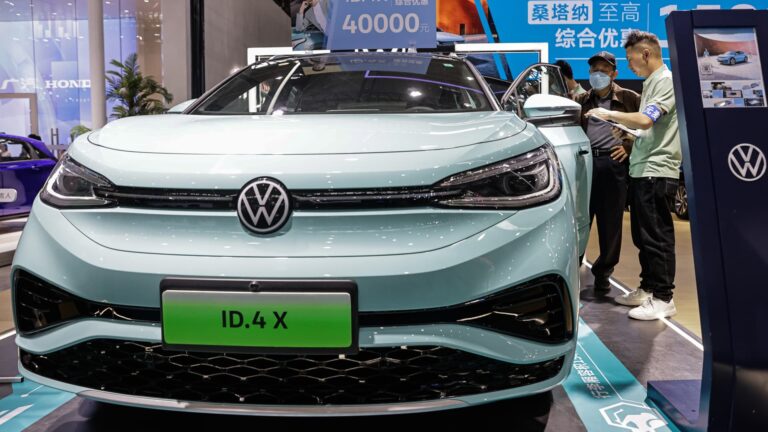Just when Chinese electric car companies may be needing the cash, foreign automakers need the market — not only in China but globally. Chinese EV startup Xpeng stunned markets Wednesday with news of a roughly $700 million stake from Volkswagen to jointly develop two cars for China, the largest auto market in the world. Xpeng’s stock soared. U.S.-traded shares are up 135% year to date through Friday’s close. A few months earlier, the stock was in the red for 2023. Everbright Securities upgraded the stock to buy, expecting it to outperform the broader market by at least 15% in the next six to 12 months. “Technological licensing may become a new model for driving profits,” the report said in Chinese, translated by CNBC. Large brands such as Volkswagen have supply chain control and cash flow, but their tech abilities lag, the report said. On the other hand, it pointed out, while new domestic Chinese brands have the tech, but relatively weak production management and cash flow. Xpeng is arguably the only brand in China to offer the equivalent of Tesla’s Full Self Driving software to help drivers navigate city streets. FSD isn’t available in China yet, and only a few cities have approved Xpeng’s version so far. But the startup’s cash and cash equivalents nearly halved in the first quarter, down to 8.83 billion yuan ($1.23 billion) from 14.61 billion yuan at the end of 2022. Xpeng’s deliveries have stagnated at several thousand a month. Volkswagen isn’t faring much better in China’s electric car market, with an average of just over 10,000 vehicles delivered each month in the first half of the year. But as an established global giant, Volkswagen’s cash and cash equivalents were a far higher 37.13 billion euros ($40.73 billion) at the end of June, up from 29.17 billion euros in December. The German automaker also has more to lose. Its passenger car deliveries to China are on par with those to Western Europe. Volkswagen on Thursday cut its delivery outlook for 2023. Not only did its China vehicle deliveries for the year through the end of June decline, but its all-electric car deliveries had fallen by 1.6%. That’s compared to the same period in 2022, when a two-month lockdown in Shanghai wiped out the metropolis’ April sales. Volkswagen attributed the recent drop to a parts shortage and “increasing intensity of competition.” China’s homegrown electric car brands from BYD to Zeekr have piled into the local market, where Tesla still commands a hefty share. Nio , whose cars sell in a higher price range than Xpeng’s, warned in June that lackluster deliveries were affecting its cash levels. Back in 2019, the startup had teetered on the brink of bankruptcy until it received a lifeline of about $1 billion from local investors , including state-backed entities. In late June, Nio announced a roughly $700 million injection of its own – from an Abu Dhabi investor wanting to bring the electric cars to a region that’s trying to move away from fossil fuels. Nio reported cash and cash equivalents of 14.76 billion yuan as of March, below what it disclosed for the end of 2022. Of course, cash levels only matter relative to how much a company owes. A quick ratio looks at the ability to pay short-term debt. Li Auto was the only one of the three U.S.-listed Chinese electric car companies to have the healthiest reading above 1, according to a Wind Information screen for the first quarter. Nio and Xpeng both had readings below 1, and down slightly from the end of 2022, the data showed. Volkswagen’s was up slightly during that time, but also below 1 at near 0.8. In terms of growth opportunities, the market is in the companies’ favor. China’s electric car market is set to grow by 27% this year to 8.7 million units — and remain the largest in the world in coming years, according to Bank of America Securities. The country’s prowess in the industry also means China is exporting more vehicles abroad. The International Energy Agency said 35% of exported electric cars in 2022 came from China, up from 25% in 2021. But the stocks to buy aren’t necessarily the automakers themselves. In Nomura’s view, they’re neutral on Xpeng and don’t cover Volkswagen. Their buys are for makers of components that go into electric cars with assisted driving capabilities, including battery giant CATL and motor controller supplier Inovance.
Subscribe for Updates
Get the latest creative news from TOPPIKR about world, politics and business.



